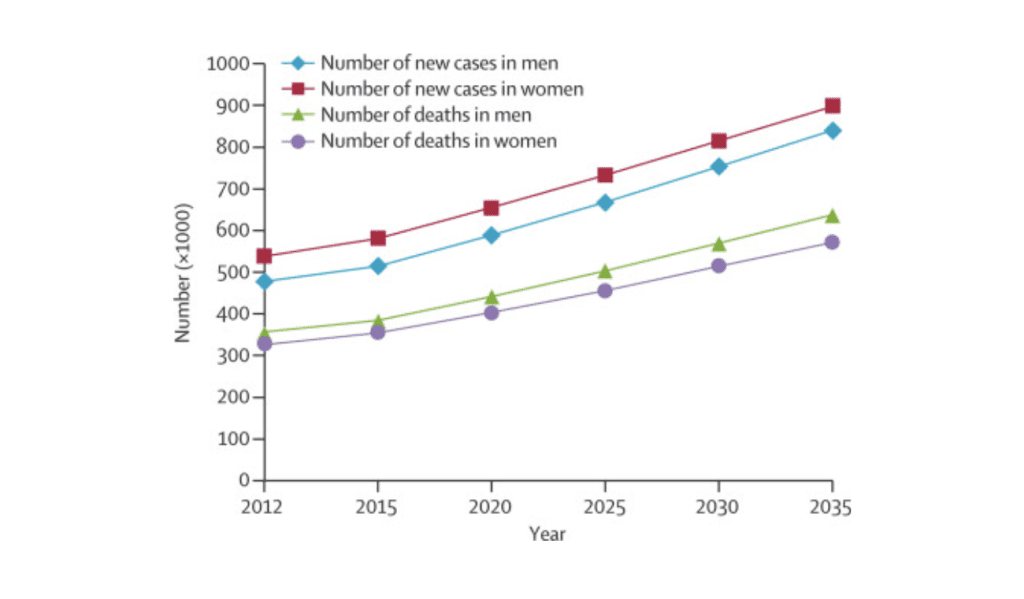Collaboration – Leveraging Technology
Read the Magazine in PDF
India's low-tech initiative not only grants access to expert opinions but also educates medical professionals in remote areas through quality reporting and pathology workshops and training sessions.
By - Dr C S Pramesh
Abstract
This article focuses on how PepsiCo, a global leader in the food and beverage industry, is exploring the use of technology to overcome the significant challenges it is facing in India. We will delve into the specific issues that are affecting the company in India and how technology can be leveraged to address these challenges, not just in India, but also for the company’s global operations.
The Problems Facing PepsiCo in India
Access to quality healthcare is one of the major issues that PepsiCo is currently facing in India. According to a recent study, a significant number of cancer patients (60%) visiting the Diamond Hospital in Mumbai are from other parts of India and neighbouring countries, as opposed to only 38% from the city itself. This is primarily due to the high costs and long travel times associated with accessing healthcare in large cities like Mumbai. In addition, the global incidence of cancer is on the rise, making it even more challenging for patients to access quality care. The situation is particularly dire in the northeast regions of India, where the patient population is significantly lower than in the southern parts of the country.
Leveraging Technology to Solve Problems
Projected cancer burden in India
PepsiCo is exploring innovative ways to use technology to address the challenges it faces in India. One of the key issues is the lack of accessible and affordable healthcare, especially for cancer patients in remote areas. Technology can help address this problem by providing telemedicine and e-health platforms that connect patients with doctors and specialists. This can help reduce the need for expensive travel and improve the overall quality of care by enabling the efficient management of patient data. However, India is facing a growing burden of cancer, with a 70% increase in cancer incidence expected in the next few decades. The high cost of healthcare, with 70% of expenses being out-of-pocket and only 20% coming from public funds, exacerbates the situation. In addition, India spends a lower portion of its GDP on healthcare and has a lower per capita GDP compared to the UK, making it difficult to provide adequate cancer care, especially in rural areas with fewer patients.

Over a decade ago, the Government of India established the National Cancer Grid to address the growing problem of cancer and provide better access to care for all patients. The network, which includes over 170 cancer centres, aims to eliminate disparities in cancer care and promote uniform standards of care, develop human resources, and facilitate collaborative cancer research. The success of this program serves as a model for other countries facing similar challenges in providing adequate care for cancer patients. As cancer continues to be a growing problem worldwide, public and private entities can learn from the collaborative approach taken by the National Cancer Grid. Despite the success of the National Cancer Grid in India, significant challenges remain in providing adequate care to all cancer patients. The disparity in access to care between urban and rural areas persists, and there is a need for more resources to address this issue. The high cost of healthcare remains a significant burden, and public health expenditure needs to increase to ensure that all patients can receive the care they need. While the National Cancer Grid is a step in the right direction, more efforts are required to ensure that all patients can access quality care. These challenges are not unique to India, and many countries worldwide are facing similar issues. Addressing the growing burden of cancer and improving access to care requires collaboration among public and private entities globally.
Eight years ago, a group of experts in global oncology set out to provide affordable and fair cancer care in India, despite the country’s growing population of patients and its healthcare system’s challenges. The team faced a daunting task, but they were committed to finding a solution. One of their initial steps was to examine the literature on identifying national priorities and compare it with global research. This approach helped them to better comprehend the issues that required attention and the efforts being made to address them.
To ensure quality cancer care, the team initiated the creation of standardized treatment guidelines. Although the first edition of these guidelines was published in 2017, they quickly discovered that they needed to be simplified to be accessible to smaller hospitals and clinics in India. A group of global oncology experts set out on a mission to make cancer care affordable and equitable in India eight years ago. This was a difficult task given the increasing number of cancer patients in India and the challenges of the country’s healthcare system. To understand the issues and existing efforts to address them, the team reviewed national priorities and global research. To provide high-quality cancer care, the team developed uniform treatment guidelines that were simplified for accessibility to smaller healthcare facilities. The guidelines were well received and based on the latest evidence to minimize overuse. The Deputy CEO of the National Authority committed to delivering these guidelines to the healthcare system in India, resulting in the poorest 40% of the population having access to evidence-based cancer treatment. However, a reimbursement system was needed to provide funding for treatment, which the team worked on creating.
A team of experts in global oncology took on the challenge of improving cancer care in India eight years ago, and their efforts have had a significant impact. They created uniform treatment guidelines based on the latest evidence, which have enabled the poorest 40% of the population to access quality cancer treatment.
The initial action taken by the team was to establish a set of uniform treatment guidelines that would be accessible to hospitals and clinics of all sizes and capabilities. These guidelines were introduced in 2017 and have since been updated to ensure they include the most effective interventions while also avoiding the overuse of certain treatments. The Deputy CEO of the National Institute of Cancer Care and Research committed to making these guidelines available to the wider community as soon as they were launched. Another innovative aspect of the initiative was its emphasis on quality assurance in pathology. The initiative not only made expert opinions accessible to patients but also provided education and training to smaller centres on handling complex cancer cases. The initiative is part of a larger group that has negotiated with publishers to provide subscription access to leading cancer journals at a lower cost. Over the past eight years, the initiative has expanded, treating over 4,000 patients and providing education to numerous smaller centres. This approach is a unique and effective solution to the challenges faced by countries with limited resources when it comes to providing quality cancer care. By incorporating technology, pooling resources, and democratizing education, the initiative offers a viable path to improving cancer treatment for all.
Having access to high-quality healthcare is a fundamental right to which everyone should be entitled. Unfortunately, in many parts of the world, this right is not accessible to everyone, especially those living in remote or rural areas. However, a low-tech initiative in India is attempting to address this problem. This initiative is based in the Northeast of India and is primarily focused on improving access to quality pathology services. The initiative acknowledges that traditional systems of quality assurance in pathology are both resource-intensive and costly, which poses a significant challenge for individuals living in rural areas. To tackle this problem, the initiative has developed a more streamlined and efficient version of the traditional system. By leveraging technology, this initiative is democratizing access to quality medical care. Patients can now upload their pathology data, including images, to a web-based platform. The platform then processes the data and provides expert opinions from various medical professionals such as surgeons, medical oncologists, and pathologists, all within a turnaround time of 24 hours.
The low-tech initiative in India not only provides access to expert opinions but also focuses on educating medical professionals in remote and rural areas through workshops and training sessions on quality reporting and pathology. It has secured subscriptions to leading cancer journals for its members and has successfully negotiated discounts ranging from 20% to 95% off the MRP with pharmaceutical companies by pooling demand for medicine from various centres. The initiative’s emphasis on democratizing access to expert opinions, education, and affordable medication serves as a blueprint for other initiatives worldwide and showcases how technology can enhance access to quality healthcare.
The Cost of Cancer Medications: A New Era of Healthcare
A team of healthcare professionals is working to reduce the cost of cancer medications and improve patient care by focusing on patient records, enabling patients to share their health records, and collaborating with clinicians to conduct studies. The group’s flagship initiative, the Smart Project, has helped reduce medication costs by a quarter of their original price. The team has also established the Centre for Global Health and the Centre for Digital Oncology, which aims to consolidate chronic medical records, digitize treatment protocols, and use machine learning and AI to enhance diagnostics and patient care pathways. The group’s efforts are supported by various organizations at national and international levels, as well as private entities, and their achievements are praiseworthy.
Conclusion
In conclusion, the use of technology and collaboration is crucial in overcoming the significant challenges faced by companies and countries in providing access to quality healthcare, especially for cancer patients. PepsiCo’s exploration of telemedicine and e-health platforms is a step in the right direction, but more efforts are required to ensure that all patients can access quality care. The National Cancer Grid in India serves as a model for other countries facing similar challenges, and the success of the team of experts in global oncology in creating uniform treatment guidelines based on the latest evidence is a testament to the power of determination and collaboration. Addressing the growing burden of cancer and improving access to care requires a joint effort from public and private entities worldwide.




